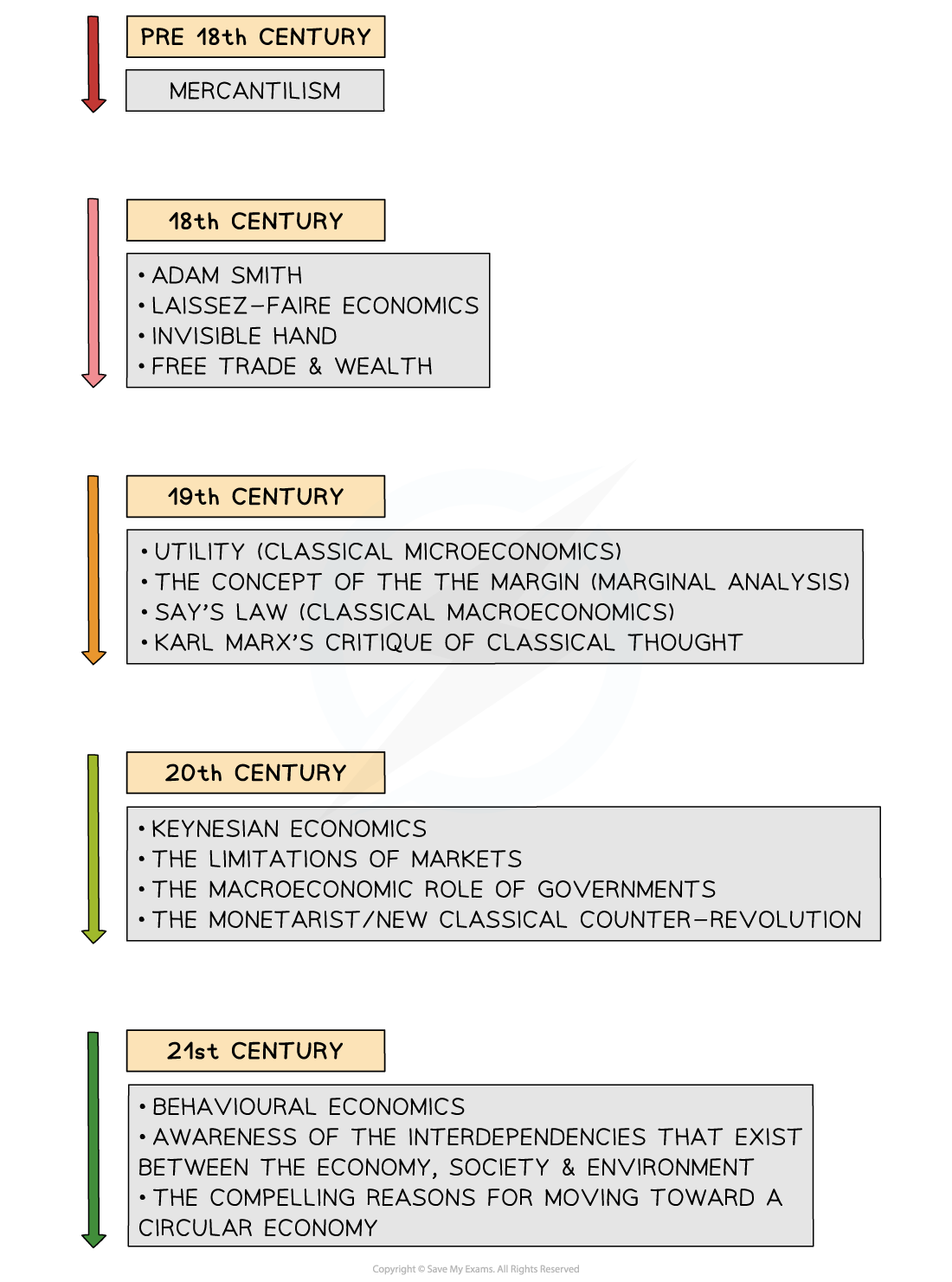Introduction to Economic Thought
- Understanding the evolution of economic thought over the past 400 years, helps us to understand the strengths and weaknesses of economic policies we use today
- Each period of economic revolution was created as a result of challenges societies were facing at the time e.g. classical economics was the solution to centuries of mercantilism while Marxism was the solution to capitalism and worker exploitation
- There is a strong debate around whether societies should create a new economics fit for the 21st century challenges

A summary of the economic schools of thought from the 18th century
Economic Ideas from the 18th Century
- Adam Smith published his famous book on Economics in 1776: The Wealth of Nations
- He is widely regarded as the father of Classical Economics
- He is widely regarded as the father of Classical Economics
- Written at the start of The Industrial Revolution, it captured his thoughts on how markets could be coordinated by demand and supply
- This book was a natural response to the previous century of government intervention in markets in Europe during a period known as mercantilism
Key ideas from Adam Smith in the 18th Century
|
Idea
|
Explanation |
|
Laissez-faire ('to leave alone') economics |
|
|
Invisible hand |
|
|
Free trade |
|
|
Wealth |
|
Economic Ideas from the 19th Century
- During the 19th century, several key ideas emerged including classical microeconomics (utility); the concept of the margin; classical macroeconomics (Say’s law)
- During this period Karl Marx also developed his critique of classical economic thought
Key ideas from the 19th Century
|
Idea
|
Explanation |
|
Classical microeconomics |
|
|
The concept of the margin |
|
|
Classical macroeconomics |
|
Karl Marx's Critique of Classical Economic Thought
- Free markets generated incredible wealth in the Western World
- Karl Marx, a German philosopher, identified that wealth seemed to come from worker exploitation (a natural function of profit maximisation) and that inequality was deepening in societies
- The exploitation was seen in low wages and poor working conditions
- The owners of the factors of production (capitalists) generated the highest income (wages, interest, rent and profit)
- If all someone had to offer was labour, and wages were suppressed: then inequality was bound to increase
- Marx argued that capitalism would eventually lead workers to revolt and that periods of exploitation would be followed by revolutions
- These revolutions would require government intervention to restore stability and equality
- Governments would need to be involved in the allocation of resources (command economy) to prevent the pattern from repeating
- Marx's ideas were incredibly influential and within a relatively short time frame resulted in more than a third of the world's population living in economies influenced by his ideas
Economic Ideas from the 20th Century
- The first half of the 20th Century was dominated by the two World Wars and the Great Depression
- The economic ideas of the previous century no longer worked
- In this severe recession, Say's Law became obsolete as households were unable to buy goods/services due to a complete lack of income
- John Maynard Keynes, a British economist from Cambridge felt new ideas were needed
- His ideas were quickly embraced and the next 50 years saw a widespread Keynesian revolution as governments adopted Keynesian economics
Key ideas from Keynes in the 20th Century
|
Idea
|
Explanation |
|
The limitations of markets |
|
|
The Macroeconomic role of Governments |
|
The Monetarist/New Classical Counter Revolution
- Monetarism is an economic school of thought which emphasises the use of Monetary Policy to influence an economy
- Monetarists believe that poor monetary policy lead to the Great Depression
- Monetarists believe that the use of fiscal policy leads to inflation as government spending increases aggregate demand
- Milton Friedman was one of the leading Monetarists of the late 20th Century
- His ideas influenced Ronald Reagan in the USA and Margaret Thatcher in the United Kingdom
- Both Governments moved away from Keynesian economics
- From the early 1980s there was a resurgence in the belief in classical economics and laissez-faire markets
- Government spending reduced and the focus shifted to Supply-Side Policies
- One prominent Supply-Side Policy that the USA and the UK embraced was the use of privatisation
Economic Ideas from the 21st Century
- The early part of the 21st Century has seen several significant global challenges emerge
- Climate change
- On-going wars and displacement of populations
- An increase of global population in the last 100 years by 7 billion people
- The Global Financial Crisis of 2008
- The Covid Recession of 2020
- Keynesian economic thought came to prominence again with the 2008 Financial Crisis as governments chose to spend their way out of trouble
- Government spending increased to levels never seen before, continuing for more than a decade
- This increased spending was financed by increased government borrowing
- Increased Government borrowing creates increased tax burdens for future generations
- Even with Government spending extraordinarily high in many economies, expansionary Monetary Policy had to be widely used to bring stability
- This pattern of events prompted calls for societies to rethink Economics
- It called for an economic philosophy to emerge that is no longer rooted in 'old thinking'
- It called for ideas fit for a 21st Century world
21st Century Ideas
|
Idea
|
Explanation |
|
The growing role of behavioural economics |
|
|
Awareness of the interdependencies that exist between the economy, society and environment |
|
|
The compelling reasons for moving toward a circular economy |
|